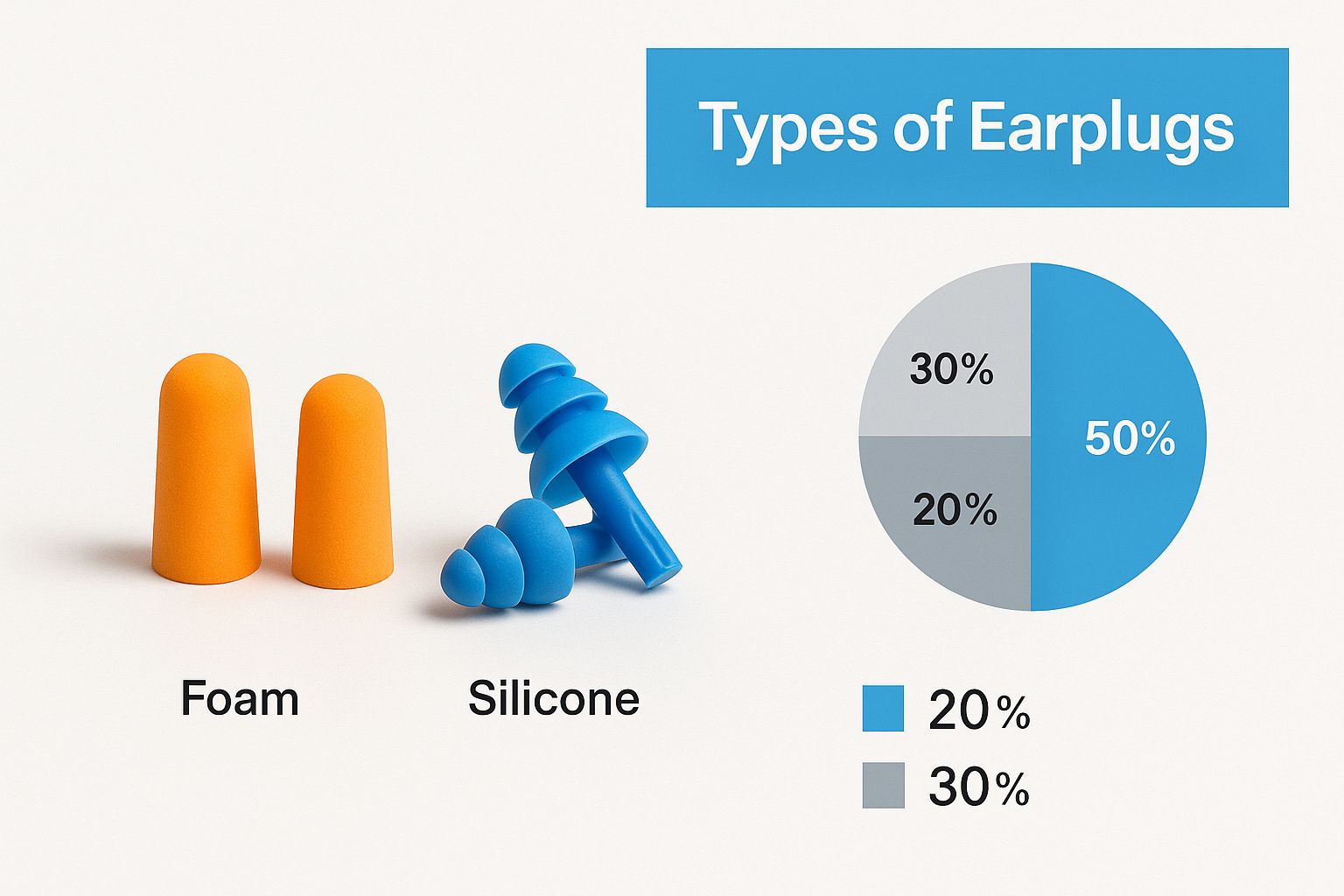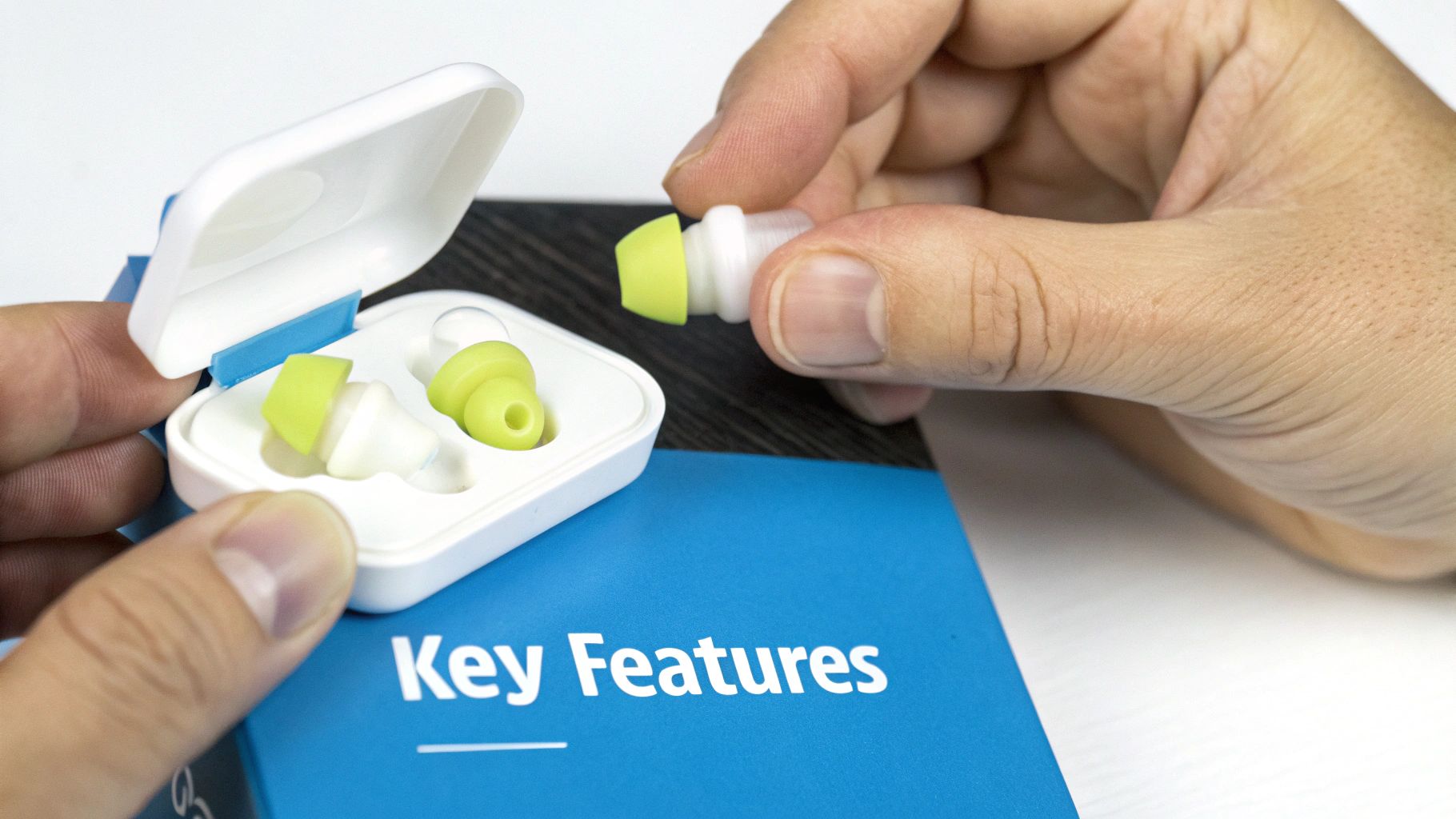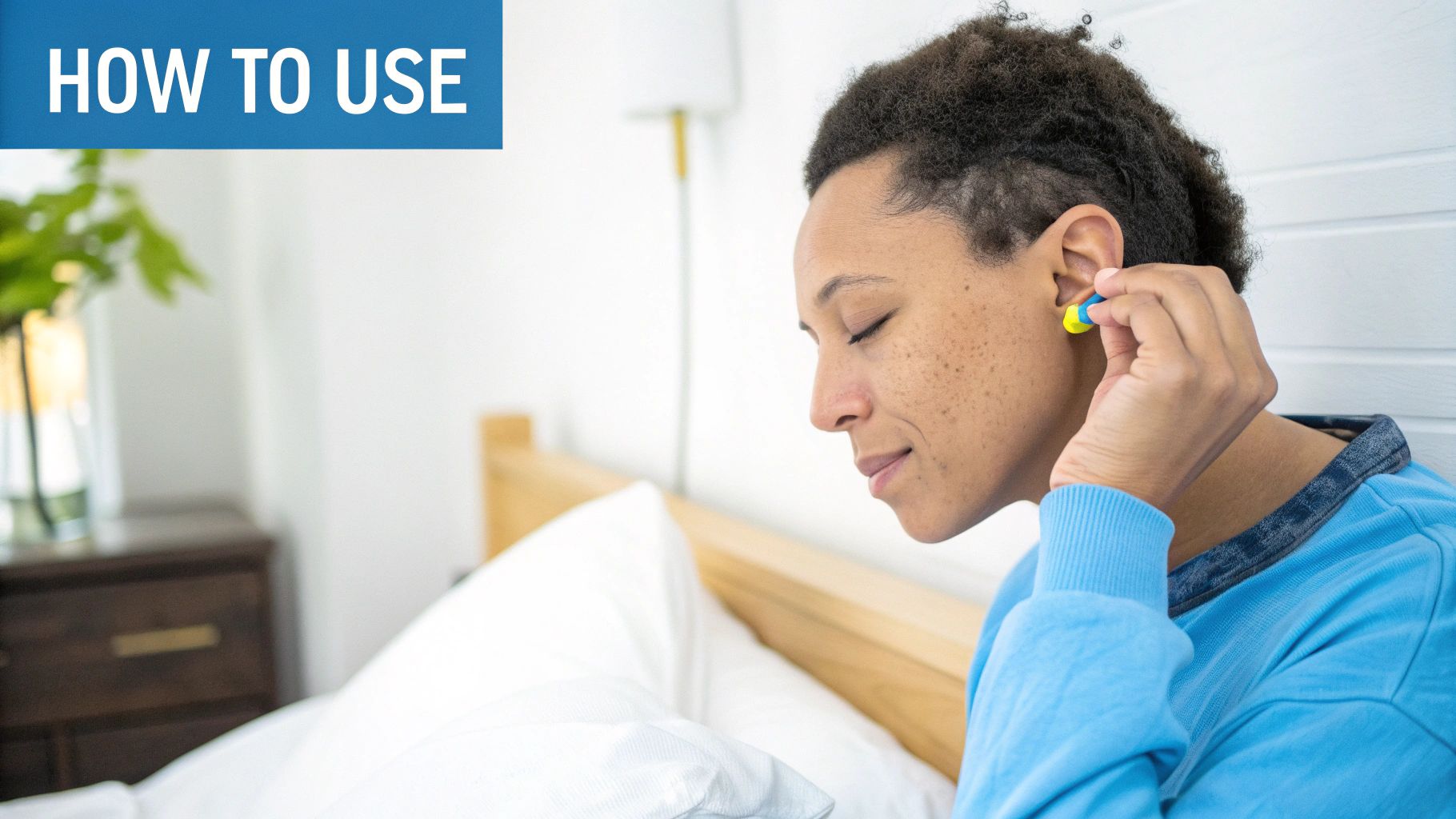When your partner's snoring feels like a nightly freight train roaring through the bedroom, earplugs are often the quickest, most effective way to reclaim your peace and quiet. They act as a simple physical barrier, turning the volume down on the snoring so you can finally get some uninterrupted rest. Finding the right pair can honestly be the difference between another night of tossing and turning and waking up feeling human again.
The Nightly Battle Against Your Partner's Snoring
We’ve all been there. That jarring moment you’re ripped from a deep sleep by a sudden, loud snore. It’s a feeling many of us know far too well. It’s more than just noise, isn't it? It's the frustration, the constant interruptions, and the strain it can put on even the strongest relationships. This isn't some minor pet peeve; it's a real problem that chips away at your health and happiness night after night.
The toll of sleeping next to a snorer is both physical and emotional. Habitual snoring is incredibly common, and its impact on partners is huge. A survey from SleepFoundation.org painted a clear picture: among partners of loud, habitual snorers, a staggering 44% reported daytime sleepiness. On top of that, 33% experienced mood issues, and 19% said it was putting a serious strain on their relationship. You can dig into the full findings over at SleepFoundation.org.
More Than Just Noise
The consequences of this nightly disruption ripple through your entire day. When your sleep is repeatedly broken, you never get to sink into those deep, restorative stages your body and mind desperately need. This leads to a whole cascade of negative effects that can seriously diminish your quality of life.
- Physical Exhaustion: You might feel a bone-deep tiredness that no amount of coffee can fix.
- Emotional Strain: Irritability and mood swings can become your new normal, affecting how you interact with everyone, including your partner.
- Cognitive Fog: Having trouble concentrating or remembering things? That can interfere with everything from your work to your daily to-do list.
This cycle of terrible sleep and daytime fatigue is a heavy burden to carry. It's why finding a solution isn't a luxury—it's absolutely essential for your well-being.
Ultimately, you have to address how snoring affects your sleep. Using earplugs is a proactive step you can take right now to create a more peaceful sleep environment. It puts you back in control of the situation, ensuring you get the rest you need to be your best self—for you and for your relationship.
Finding the Right Earplugs to Block Snoring
Not all earplugs are created equal, especially when you’re trying to silence the low-frequency rumble of a snoring partner. This isn't just about blocking sound; it's about finding something you can actually wear all night, every night, without discomfort.
The search for a quiet night's sleep is a massive deal. The U.S. earplugs market, driven largely by people dealing with sleep issues like snoring, was recently valued at over USD 400.68 million. While cheap foam plugs are still the most popular, it's clear people are looking for better, more comfortable solutions. This just goes to show how many of us are relying on this simple tool for a little peace. You can see the full market breakdown on Polaris Market Research.
This visual guide gives you a quick rundown of the main options out there.

As you can see, the "best" earplug really comes down to balancing noise reduction with what feels right in your own ears. Let's dig into the most common materials to help you find your perfect match.
Foam, Silicone, or Wax: What to Choose?
Your choice of material is the single most important decision. Each one has its own set of pros and cons when it comes to blocking out snoring sounds.
-
Foam Earplugs: These are the ones you see everywhere, and for good reason. They often have the highest Noise Reduction Rating (NRR), which is the official measure of how much sound they can block. You roll them up, they expand inside your ear canal, and they create a very tight seal. The downside? Some people, especially side sleepers, find that constant pressure a bit much for an entire night.
-
Silicone Putty Earplugs: Think of these as a moldable barrier. Instead of going deep inside your ear canal, you shape the putty to create a custom seal over the entrance. This makes them incredibly comfortable, a real game-changer for side sleepers. They’re also great at muffling snores and can be reused for several nights, which is a nice bonus.
-
Wax Earplugs: Working much like silicone putty, wax earplugs are a natural, moldable option that provides a comfortable, personalized fit. They form an excellent seal against noise. The only things to watch for are that they can sometimes leave a bit of residue and might not last quite as long as their silicone counterparts.
Use this quick comparison to find the best earplug material for your needs, from maximum noise blocking to all-night comfort.
Comparing Earplug Materials for Snoring
| Earplug Type | Best For | Noise Reduction | Comfort Level | Reusability |
|---|---|---|---|---|
| Foam | Maximum noise blocking, budget-friendly | Highest (up to 33 NRR) | Can cause pressure | Single-use |
| Silicone Putty | Side sleepers, all-night comfort | Good to Excellent | Very High | Reusable (3-5 times) |
| Wax | Natural materials, custom fit | Good to Excellent | Very High | Reusable (a few times) |
Ultimately, the goal is to find an earplug that provides both a secure seal and genuine comfort. An earplug with a sky-high NRR is totally useless if it’s too uncomfortable to keep in all night or it keeps falling out.
If you've tried traditional earplugs and just can't get on with them, don't give up. It might be worth exploring other technologies. Our guide on noise-canceling headphones for sleeping breaks down some of the alternatives that could finally help you get that quiet night you deserve.
How to Get a Perfect Noise-Blocking Fit
Look, even the most expensive, top-rated earplugs are worthless if they don’t form a proper seal in your ear. An imperfect fit lets sound leak right in, which completely defeats the purpose of wearing them in the first place.
Getting it right isn’t about shoving them in with force; it's all about technique. With just a little practice, you can create a snug, comfortable barrier that genuinely mutes even the most aggressive snoring. The key is knowing that different earplugs require different methods.

Mastering the 'Roll, Pull, Hold' for Foam
For foam earplugs—which, frankly, offer some of the best noise reduction you can get—there’s a simple technique that makes all the difference. Always, always start with clean, dry hands. You don't want to introduce any unwanted bacteria into your ear canal.
- Roll It: Pinch the earplug between your thumb and forefinger and roll it into a tight, crease-free cylinder. You want to get it as thin as you possibly can.
- Pull Your Ear: Take your opposite hand, reach over your head, and gently pull the top of your ear up and back. This little trick straightens out your ear canal, making a clear runway for the earplug.
- Insert and Hold: Quickly slide the compressed earplug in and then hold it firmly in place for 20-30 seconds. This is the crucial part. You'll feel it slowly and gently expand to create a custom, sound-tight seal.
How do you know you nailed it? Your own voice should sound muffled and far away. If things still sound pretty clear, pop it out and give it another shot.
One of the most common mistakes is not holding the earplug in place long enough for it to fully expand. Seriously, be patient here. A few extra seconds is the difference between a leaky seal and a truly silent night.
Molding Silicone and Wax Plugs Correctly
Now, moldable silicone and wax plugs are a different beast entirely. Unlike foam, these are designed to seal the entrance of your ear canal, not go down inside it. I've seen so many people try to jam them deep into the canal, which is not only wrong but can be really uncomfortable and ineffective.
To get a perfect fit with these types:
- First, warm and soften the plug by rolling the material between your fingers for a few moments. This just makes it more pliable.
- Then, shape it over the canal opening. Gently press and flatten the plug so it creates a complete, airtight cover. It should feel secure, but it shouldn't create any uncomfortable pressure.
This approach gives you an excellent seal without that "full" feeling some people get from foam plugs. It makes them a fantastic option if you're sensitive to that kind of pressure in your ear.
Advanced Tips for Undisturbed Sleep
So, you've found the right pair of earplugs to block out your partner's snoring. That’s a huge first step. But a few extra strategies can turn a good night's sleep into a truly great one, moving you beyond just finding the perfect fit to building a routine that guarantees peaceful nights.
First things first: if you're using reusable earplugs, hygiene is non-negotiable. It's a simple habit to get into. Just wash them gently with a bit of mild soap and warm water every few uses. Let them air dry completely before popping them back in their case. This quick clean prevents bacteria buildup, which can lead to nasty ear infections or irritation.

Create a Fortress of Silence
For those nights when the snoring is particularly earth-shaking, layering your sound protection can be a total game-changer. I'm talking about combining your earplugs with a white noise machine to create a powerful dual barrier against the noise. The earplugs block the sharp, sudden sounds, while the white noise machine smooths over any of those low, rumbling frequencies that still manage to sneak through.
Here’s how you can make this combo work for you:
- Position the machine strategically, placing it between you and your partner.
- Set the volume just high enough to blend with the snoring, not so loud that it becomes its own distraction.
- Choose a consistent sound. Static or a fan usually works better at masking erratic noises than things like rain or ocean waves.
This approach creates a steady, predictable soundscape. It helps your brain tune out the disruptive snoring, making it much easier to drift off and stay asleep.
A big worry for a lot of people is missing their morning alarm. Don't stress. Most earplugs are designed to muffle low-frequency sounds like snoring while still letting higher-frequency sounds (like your alarm) through. To be safe, test your alarm at a lower volume first or consider getting one that has a vibration feature.
Building a Sustainable Routine
The demand for sleeping earplugs is huge—they make up about 25% of the entire earplug market. With 35% of those sales happening online, it's clear just how many of us are desperately searching for a quiet night's sleep.
While earplugs are a fantastic tool, it's also smart to give your ears a break every now and then. If you start to feel any discomfort or irritation that lasts, take a night off. And remember, earplugs are just one piece of the puzzle. For a more complete strategy, it’s worth exploring other ways to deal with a snoring spouse that address the root of the problem.
Tackling Common Earplug Problems
So you've got your hands on what are supposed to be the best earplugs for blocking out snoring, but they’re just... not working. It can be incredibly frustrating when your solution creates a whole new set of problems.
Before you give up and toss them in the bin, hang on. Most of these issues have surprisingly simple fixes. Whether they're falling out or making your ears sore, a few small tweaks can turn a frustrating experience into a peaceful night's sleep.
Why Are My Earplugs Falling Out?
Waking up to find an earplug lost somewhere in your sheets is a classic problem. If this is happening to you, it almost always boils down to one of two culprits: you’re not inserting them correctly, or they’re simply the wrong size for your ears.
For foam earplugs, technique is everything. You need to master the "roll, pull, hold" method to get a deep, snug fit that will actually stay put. Simply squishing them and hoping for the best won't cut it.
If your technique is perfect but they still manage to escape by morning, it's time to consider the fit. Ear canals are like fingerprints—everyone's are different. A plug that's too big won't go in far enough, and one that's too small will never create a proper seal.
Dealing with Discomfort and Sore Ears
There's nothing worse than waking up to silence... and throbbing ear pain. This is a dead giveaway that something isn't right. For many people, especially side sleepers, the constant pressure from a standard foam earplug is just too much to handle all night.
Waking up with sore ears is often caused by too much pressure inside the ear canal. If you consistently feel pain after a full night's sleep, the earplugs are likely too large or the material is too firm for you.
Your best bet? Switch to a softer material that's more forgiving. Moldable silicone or wax earplugs are fantastic alternatives because they work differently.
Instead of expanding deep inside your ear canal, they form a custom-molded seal over the entrance. This approach dramatically cuts down on pressure points, often resolving soreness completely while still giving you the quiet you need.
Got Questions About Earplugs for Snoring? We've Got Answers.
When you're thinking about making earplugs a regular part of your sleep routine, a few questions are bound to pop up. We hear them all the time. Let's get you some clear, straightforward answers so you can rest easy.
Is It Really Safe to Wear Earplugs Every Single Night?
For most people, the answer is a big yes. Nightly earplug use is perfectly safe, as long as you make hygiene a priority. Think about it—you wouldn't reuse a tissue, right? Same principle.
If you're using reusable earplugs, give them a clean according to the instructions. With disposables, just toss the old pair and grab a fresh set each night. Always pop them in with clean hands. This simple habit goes a long way in preventing any pesky earwax buildup or potential infections. Of course, if you ever feel pain or serious discomfort, it's smart to take a break and check in with your doctor.
Will I Sleep Through My Alarm or a Smoke Detector?
This is probably the number one concern we hear, and it's a completely valid one. You need to block out the snoring, but you also need to wake up for work or hear an emergency alert.
The good news is that most quality sleeping earplugs are designed to target low-frequency sounds (like that rumbling snore) while letting higher-frequency noises (like an alarm clock or smoke detector) slice through.
Still worried? Give it a quick test run for your own peace of mind. Before you rely on them for a big day, set your alarm to a lower-than-usual volume and see if you can hear it. Another great option is to switch to an alarm with a vibration feature, like on your phone or a smartwatch.
What If Earplugs Just Aren't Working Out for Me?
If you've given earplugs a fair shot and they just aren't your thing, don't throw in the towel on a good night's sleep just yet. You still have some excellent options for creating a peaceful sleep environment.
- White noise machines are fantastic for masking inconsistent sounds like snoring, creating a steady, soothing hum that helps your brain tune out distractions.
- Noise-cancelling sleep headbands can be a super comfortable alternative, especially for side sleepers. They wrap you in sound without putting anything directly in your ear canal.
- Encourage a doctor's visit for your partner. It's important to remember that heavy snoring can sometimes be a sign of a more serious health issue, like sleep apnea. A gentle nudge for them to get a check-up is a good idea for both of you.
Ready to reclaim your quiet nights and wake up feeling refreshed? DubsLabs has a whole range of sleep-centric gear, from our ultra-comfortable sleep headphones to soothing weighted blankets. Find the sleep solution that clicks for you at https://www.dubslabs.com.











































